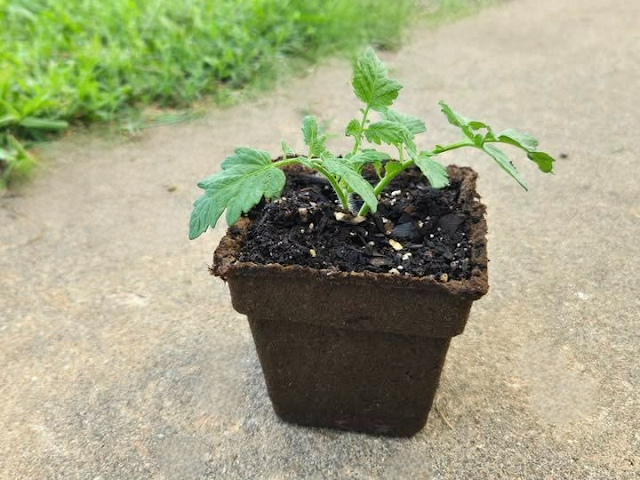Gardening Tips, Farm Life, and the CowPots® Story with Amanda Freund
If you’ve ever struggled with transplanting seedlings or wished for something better than plastic trays or peat pots, you’ll love this conversation with Amanda Freund of CowPots®.
Amanda's family farm has created a natural, biodegradable alternative that’s changing the way gardeners start seeds, and helping the planet.
Keep reading for Amanda's tips for beginning gardeners, too.
From Cow Manure to Market: The Story Behind CowPots
Amanda is part of the third generation on her family’s dairy farm in northwest Connecticut. Originally founded by her grandparents in 1948, the farm has grown into a diversified operation with three branches: the dairy itself, a farm market and garden center, and CowPots, their innovative biodegradable planting pots made from composted cow manure.
Amanda’s dad came up with the idea for CowPots while brainstorming ways to responsibly manage the farm’s large volume of manure, a challenge many livestock farms face. Inspired by the fiber-based pots his wife used in the garden center, he began experimenting with ways to turn manure into a usable gardening product.
After a decade of trial and error, CowPots officially launched in 2006.
Why CowPots Work
Unlike plastic or peat pots, CowPots are fully compostable and root-friendly. The unique fiber structure allows roots to penetrate the pot walls easily, reducing transplant shock and encouraging healthy plant growth. There’s no need to peel, crush, or cut the pot when transplanting; just plant the whole thing in the ground.
And no, they don’t smell. Amanda assures us that the pots are fully composted before use. (Even my dogs and cat ignore them!)
Because CowPots break down completely in the soil, there’s no plastic waste to worry about. Gardeners also get the added benefit of nitrogen-rich organic matter enriching their soil as the pot decomposes.
Sustainability Over Peat Pots
CowPots aren’t just effective - they’re also environmentally smart.
Peat, a common ingredient in many seed-starting products, is harvested from wetlands and takes over a hundred years to regenerate. Its extraction releases stored carbon and destroys vital ecosystems. In contrast, CowPots are made from a renewable byproduct produced daily on farms like Amanda’s.
Fun fact: the UK is phasing out peat-based products by 2030, so alternatives like CowPots are the future.
Gardening Advice from Amanda
Amanda shared some helpful advice for new and seasoned gardeners alike:
- Start small, with a few containers or a small garden. A large garden will burn you out before summer is over.
- Just because your seed packet has 200 seeds doesn’t mean you need to plant them all.
- Plant what brings you joy. (For Amanda, that’s green beans. For me, it’s cherry tomatoes.)
- Sunlight matters: your plants need full sun. Don’t be fooled by early spring sunshine: once the leaves come in, your garden might be in the shade.
- Test your soil - your local extension office can help you figure out what your soil needs, so you can grow healthier plants with fewer struggles. (Find your local cooperative extension office here.)
Where to Buy CowPots
Amanda recommends first asking your local garden center to stock CowPots if they don’t already. If they aren’t available locally, you can buy directly from Cowpots.com, where they offer both wholesale packs and small-quantity packs for home gardeners. Amanda's family's garden center also sells smaller packs online.
See the Farm in Action
Want to see where CowPots are made? The CowPots website includes a blog, a newsletter, and several behind-the-scenes videos about life on the farm and their sustainable practices. It’s a true family effort, with Amanda, her siblings, and her parents all playing important roles.
Final Thoughts
Amanda closed our conversation with a beautiful reminder: choosing to get your hands dirty is an intentional act. With so much of life tied to screens, gardening helps us reconnect to nature, to our food, and to what truly matters.
This post contains affiliate links. Read my disclosure here.
If you’d like to learn more about CowPots or try them in your own garden, you’ll find them here:
- CowPots store
- Find Cowpots at these retailers
- Also available at Amazon - choose the "CowPots" items on this page.

Kathi Rodgers is the gardener and writer behind Oak Hill Homestead (est. 2009) and the host of HOMEGROWN: Your Backyard Garden Podcast. With over 30 years of gardening experience in a variety of climates and soils, she helps new and aspiring gardeners grow healthy, organic food right in their own backyards.
A passionate advocate for simple, self-reliant living, Kathi is the author of multiple ebooks, a published magazine contributor, and shares practical advice with readers who want real-life solutions they can trust. She was also the publisher and editor of a long-running subscription newsletter (on an entirely different topic: cats).
Kathi lives in Oklahoma, where she grows more cherry tomatoes than she can count and keeps a watchful eye on tornado season. A proud grandma and great-grandma, she believes that wisdom - like a bountiful garden harvest - should be shared.













